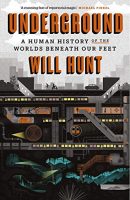
 Most roundups I’ve read of the most anticipated books of 2019 have included, among the non-fiction, Underland: A Deep Time Journey by Robert Macfarlane, which Hamish Hamilton is due to publish on May 2. A publisher’s note with the advance copy I’ve been sent describes it as “a time-travelling journey into wonder, fear and the worlds beneath our feet”.
Most roundups I’ve read of the most anticipated books of 2019 have included, among the non-fiction, Underland: A Deep Time Journey by Robert Macfarlane, which Hamish Hamilton is due to publish on May 2. A publisher’s note with the advance copy I’ve been sent describes it as “a time-travelling journey into wonder, fear and the worlds beneath our feet”.
Understandably, as it marks a debut, I’ve seen fewer mentions of a book by the American writer Will Hunt, coming at the end of this month from Simon and Schuster. It’s titled: Underground: A Human History of the Worlds Beneath Our Feet. The blurb on Hunt’s website says it’s “a panoramic study of how we are all connected to the underground, how caves and other dark hollows have frightened and enchanted us through the ages”.
I’ve yet to see a copy of Underground, and the books are under embargo, but both writers, I know, have burrowed beneath the streets in Paris. If they didn’t bump into each other in a tunnel there, or in some other region of the subterranean world, I’m presuming they sighted each other and their respective projects at some stage in cyberspace.
I’m reminded of two writers who ran away, separately, to sea a few years ago and returned with great books. In September 2013, Rose George published Deep Sea and Foreign Going (Portobello Books), an inside story of the cargo trade and its crews. Four months later came Down to the Sea in Ships (Vintage) by Horatio Clare. Both writers had travelled with Maersk, the largest container-shipping company in the world — but neither had been told about the other, perhaps because George’s trip was arranged by the London office, and Clare’s by the Copenhagen one. You can imagination their consternation when they found out. They put their heads down, got on with the writing and never got in touch. Publication schedules initially would have had the two books appearing around the same time; then Clare’s publisher delayed and left some some space between them. Both were acclaimed, both won prizes, and the authors have since appeared together at events and become good friends.
Jonathan Raban and Paul Theroux, each taking a close look at Britain in 1982, the year of the Falklands War, did run into each other while doing the legwork. Raban wrote Coasting (republished last year by Eland Books) after spending four years slowly circling the country in a 32-foot ketch, aiming to get the measure of home by putting into port as a visitor. As he was sailing clockwise around the coast, Theroux, an American, was travelling in the other direction round The Kingdom by the Sea (Penguin), by train and on foot. Their friendship, already strained, wasn’t helped when each discovered what the other was planning, but they met anyway, in Brighton. Here are the two trading exploratory jabs.
Theroux in The Kingdom by the Sea (Chapter 4):
It was strange to see a typewriter and a TV set on board, but that was the sort of boat it was, very comfy and literary, with bookshelves and curios.
“This must be your log,” I said, glancing down. The entries were sketchy (“… light rain, wind E S E…”) — nothing very literary here, no dialogue, no exclamation marks.
He said, “I keep planning to make notes, but I never seem to get round to it. What about you?”
“I fiddle around,” I said. It was a lie. I did nothing but make notes…
Raban in Coasting (Chapter 5):
It took Paul less than five minutes to sum up the boat…
“Yeah,” he said, “it’s kind of… tubby and… bookish.”
The phrase rattled me. I rather thought that somewhere I had written it down myself.
“You making a lot of notes?”
“No,” I lied. “I seem too busy with things like weather and navigation to notice anything on land…”
* Some time after putting up this post, I reviewed Will Hunt’s Underground and interviewed Robert Macfarlane about Underland.

Leave a Reply